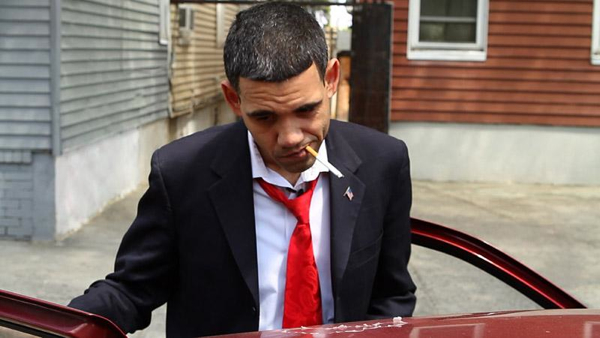Movie review by Greg Carlson
The uncanny resemblance of Louis Ortiz to the 44th president of the United States supplies the fuel in Ryan Murdock’s “Bronx Obama,” an engaging and entertaining documentary that follows the ups and downs of a regular guy trying to make ends meet on the basis of his physical similarities to one of the most well-known people in the world. Unflappable, affable, and down to earth, Ortiz makes a terrific movie subject as he recounts the tale of his decision to take a chance on a career impersonating Barack Obama. Hitching one’s wagon to the political star of a sitting head of state is risky business, but the ongoing circus sets up the conditions for Murdock to deliver a very warm, funny, and thoughtful take on the contours of an American Dream.
At the time of Ortiz’s epiphany in 2008, the former Verizon field technician had been unemployed for about a year and was financially struggling. Williamsbridge Tavern bartender and friend Pat DeBelles was the first person to suggest to Ortiz that there might be real economic opportunities playing Obama. Even though Ortiz was skeptical, he changed his mind when he shaved his mustache and goatee and took a long look in the mirror.
In the introduction to Murdock’s February 17, 2012 “This American Life” segment called “The Audacity of Louis Ortiz” (which was the doc’s original title as well), host Ira Glass hints at the motivations for adopting a different personality, saying “Usually when you play a part, the expectations are pretty clear. There are lines. There’s a script. There’s a storyline you follow. So when you’re on the kiss cam you kiss. When you’re Hamlet you stress out. You know what you’re on stage to do.” Glass also anticipates Murdock’s angle in the film version, shrewdly recognizing that Ortiz “…found himself in a part with huge expectations and no script whatsoever. He had to make it up as he went along.”
That idea and the surrounding implications of the psychological toll levied by a sometimes thankless gig are explored by Murdock in any number of ways throughout the movie. One minute, Ortiz is treated like a rock star and the next minute, people are shouting hostile insults. Ortiz makes an appearance on “Flight of the Conchords.” He performs with a rock group of fellow impersonators playing Nobel Peace Prize recipients. Most entertainingly, he finds himself in league with a talent manager named Dustin Gold, whose abrasive onscreen persona contrasts with Ortiz’s calm demeanor. Gold’s roster includes versions of Mitt Romney and Bill Clinton, and “Bronx Obama” spends a significant amount of time exploring Ortiz’s transition from mere lookalike to full-fledged performer capable of approximating the vocal cadences and nuances of President Obama.
Murdock finds the emotional core of his film in the relationship shared between single father Ortiz and his teenage daughter Reina. Geographically separated by Ortiz’s demanding and sometimes unpredictable travel schedule, the two frequently communicate through video chat. The audience glimpses Ortiz’s devotion to Reina as well as his feelings of regret and guilt for not being more present. Narratively, it doesn’t hurt that Ortiz’s parenthood calls to mind Obama’s own daughters, providing one more example of the ways that class divisions shape “Bronx Obama” into a modern echo of Mark Twain’s “The Prince and the Pauper.”
